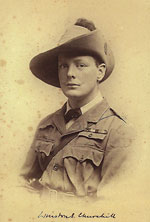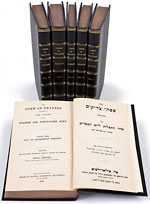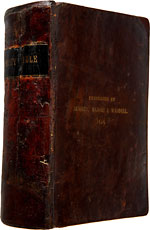Churchill’s Dangerous Letter, Napoléon’s Stolen Novel, and a Pony Express Bible
“The Most Dangerous 2 Minutes”
Winston Churchill, autograph letters: a young man’s description of his first cavalry charge, £30,000 ($44,130), and a resolute wartime leader putting down a doubter, £34,850 ($51,264) at Christie’s London on June 2.
Malcolm S. Forbes Jr., like his father and grandfather before him, regarded Winston Churchill as an heroic figure and spent 30 years assembling an exceptional collection of letters, documents, books, and photographs. More is to come in New York in December, but the first part of that collection was put up for sale in London this summer. Results in London were rather disappointing overall, with a 40 percent failure rate by lot, but these are a couple of the high spots.
In 1898, the young Winston took three months leave from the India Army, travelling to Egypt and thence up the Nile to join the 21st Lancers, part of Kitchener’s 25,000-strong army in the Sudan. A long letter that he wrote to General Sir Ian Hamilton, describing his experience of a cavalry charge against Khalifa’s Dervish army, includes the following:
I looked back and saw the Dervish mass reforming. The charge had passed through knocking over nearly half. They were getting on their legs again and their Emirs were trying to collect them into a lump again. I realised that this mass was about 20 yards away and I looked down at them stupidly for what may have been 2 seconds. Then I saw two men get down on their knees and take aim with rifles—and for the first time the danger & peril came home to me. I turned and galloped.
The squadron was reforming nearly 150 [yards] away. As I turned both shots were fired and at that close range I was grievously anxious. But I heard none of their bullets—which went heaven know where. So I pulled into a canter and rejoined my troop—having fired exactly 10 shots & emptied my pistol—but without a hair of my horse or a stitch of my clothing being touched. Very few can say the same … the realisation of our loss did not come to me until we reformed and I saw the wounded etc. It was I suppose the most dangerous 2 minutes I shall live to see.
Another of the more unexpectedly expensive letters was also the shortest—a brief and brutal response to Eliot Crawshay-Williams, a former assistant private secretary, who in 1940 had written to his old boss, pleading with him to take a realistic approach to the war with Germany and make terms with Hitler.
Churchill returned his letter with a terse note of his own. “I am ashamed of you for writing such a letter. I return it to you—to burn & forget.” Crawshay-Williams did neither, and his letter and Churchill’s sharp reply were both part of the lot.
Taken not so very long after his Sudan adventures, the signed photograph of young Winston wearing the uniform of a lieutenant in the South African Light Horse seen here was sold for £5,000 ($7,360).
Sephardic Prayers for Royalists and Republicans
Isaac Leeser (Editor), Siddur Siphthei Tzaddikim / The Form of Prayer according to the Custom of the Spanish and Portuguese Jews, $46,740 at Kestenbaum of New York on May 27.
Leeser’s comprehensive Sephardic prayer book was the first American edition containing the liturgy for the entire year. Containing the original Hebrew text and English translation, it was printed in six volumes in Philadelphia in 1837-38 but was aimed at audiences both in America and the British colonies in the Caribbean. It thus included prayers for both Royal and Republican governments.
Stained in places, this ex-library set has been rebound in period style in calf-backed boards.
The Good Book Hits the Pony Express
A Pony Express Bible, $20,315 at Heritage of Dallas on May 21.
Alexander Majors, one of the partners who founded the Pony Express mail service in 1860, was a man of deeply held religious beliefs, and he insisted that all employees of Russell, Majors & Waddell should honor the Sabbath. He even went so far as to require each employee to sign an oath to that effect. Pony Express riders were no exception, and they were all issued with a Bible from the stock of specially bound copies that Majors had ordered for the company’s wagon train crews.
Heritage cites a 1960 census that identifies a dozen copies now preserved in institutional collections and reckons only two or three have come to market in the last 30 years. They sold one of them 2007 for $38,837 and considered this example to be slightly better preserved.
Old inscriptions inside the covers bear the name of the McGaugh family, but though this was a name well known in Missouri at the time, any direct connection with the St. Joseph-based Russell, Majors & Waddell company has yet to be established.








 Ian McKay’s weekly column in Antiques Trade Gazette has been running for more than 30 years.
Ian McKay’s weekly column in Antiques Trade Gazette has been running for more than 30 years.

